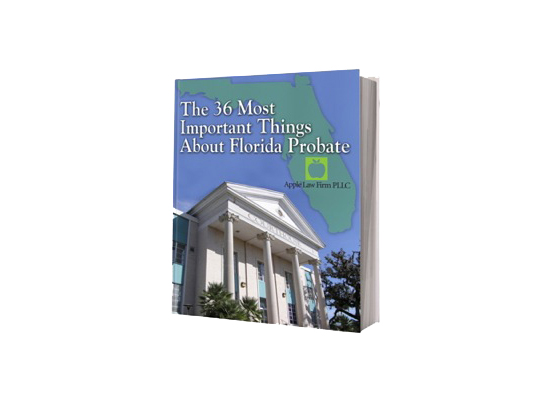LANDING SAFER
Differences Between a Florida Will and Trust
Navigating the complexities of estate planning in Florida can often feel overwhelming. With terms like ‘wills’, ‘trusts’, and ‘probate’ frequently mentioned, it’s crucial to understand what each entails and how they impact your estate planning decisions. In Florida, the specifics of managing your assets after death hinge significantly on whether you have a will, a trust, or neither. This article aims to demystify these concepts, providing clear, concise information to help you make informed decisions about your estate. Whether you’re planning your estate for the first time or looking to update your existing plans, understanding the differences between a will and a trust, as well as the intricacies of the probate process in Florida, is essential.
Understanding a Florida Will
Definition a Will in Florida: In Florida, a will, also known as a ‘Last Will and Testament’, is a legal document that outlines how a person (the testator) wishes their property and assets to be distributed after death. It holds legal standing only when it complies with Florida law, which requires the will to be in writing, signed by the testator, and witnessed by at least two individuals and while not required, a notary or self proving affidavit can be beneficial. This document becomes a pivotal part of the estate planning process, ensuring that the testator’s wishes are known and considered legally binding upon their passing.
Key Components of a Will: A well-structured will in Florida typically includes several key components:
- Executor: This is the person appointed by the testator to carry out the instructions in the will. The executor is responsible for managing the estate, paying debts and taxes, and distributing assets as specified.
- Beneficiaries: These are the individuals or entities designated by the testator to receive assets or properties. A beneficiary can be a family member, friend, charitable organization, or any entity the testator chooses.
- Assets and Property: A detailed list of the testator’s assets and properties that are to be distributed. This can include real estate, bank accounts, investments, personal belongings, and more.
- Guardianship Designations: If the testator has minor children, the will can specify who should assume guardianship of these children.
Execution of a Will After Death in Florida: Upon the death of the testator, the will must be submitted to the probate court in the county where the deceased resided. The executor then steps in to manage the estate according to the wishes outlined in the will. This process includes paying off debts and taxes before distributing the remaining assets to the beneficiaries.
Role of Probate Court in Administering a Will: The probate court plays a crucial role in the administration of a will in Florida. It ensures that:
- The will is valid and meets all legal requirements.
- The assets are accurately identified and appraised.
- The debts and taxes owed by the estate are paid off.
- The remaining assets are distributed to the beneficiaries as per the will’s instructions.
The probate process can vary in length and complexity, depending on the size of the estate and whether the will is contested. In cases where the will is straightforward and uncontested, the process can be relatively quick and smooth. However, if there are disputes among beneficiaries or questions about the validity of the will, the process can become more complicated and drawn out.
The court’s involvement ensures that the will’s execution adheres to legal standards and the testator’s intentions. Throughout this process, the executor acts as the representative of the estate, handling interactions with the court, creditors, and beneficiaries. They are responsible for the meticulous execution of each step, often with the assistance of a legal professional to navigate the complexities of Florida’s probate laws.
In summary, understanding the role of a will in Florida’s legal framework is crucial for effective estate planning. It’s a document that not only conveys your wishes regarding your assets but also provides instructions for your executor and guidance for the probate court to ensure those wishes are honored. With its key components and the critical role it plays in the probate process, a well-crafted will is an essential tool for managing your legacy in Florida.
Exploring Trusts in Florida Definition of a Trust and Its Types (Revocable vs. Irrevocable)
A trust is a legal arrangement in Florida where one party, known as the settlor or grantor, gives another party, the trustee, the right to hold title to property or assets for the benefit of a third party, the beneficiaries. Trusts are versatile estate planning tools and come in various types, primarily categorized as revocable or irrevocable.
- Revocable Trust: Also known as a living trust, this type can be altered or revoked by the settlor at any time during their lifetime. It becomes irrevocable upon the settlor’s death or a predefined event.
- Irrevocable Trust: Once established, this type of trust generally cannot revoked. We draft irrevocable trusts that can be canceled, and changed within limitations. A Florid irrevocable trust can offer certain benefits, such as asset protection and tax advantages, but at the cost of the settlor relinquishing control over the ability to cancel the trust through revocation and it can limit who can receive the assets in the trust to provide the protection desired.
Parties involved in a trust: Settlor, trustee, beneficiaries. Advantages of creating a trust in Florida (e.g., privacy, avoiding probate).
Differences in managing assets during the settlor’s lifetime and after death.
- Settlor (Grantor): The individual who creates the trust and places assets into it.
- Trustee: The person or entity responsible for managing the trust and its assets according to the trust’s terms for the benefit of the beneficiaries.
- Beneficiaries: The individuals or entities who are to benefit from the trust. They may receive income or principal from the trust either immediately or at some point in the future.
Advantages of Creating a Trust in Florida
- Avoiding Probate: Assets held in a trust are not subject to the probate process, which can save time and money and maintain privacy.
- Privacy: Unlike wills, which become public records through the probate process, trusts are private documents.
- Flexibility and Control: Trusts provide flexibility and ongoing control over asset management and distribution, which can be tailored to specific needs and circumstances.
- Protection and Estate Tax Benefits: Irrevocable trusts can offer protection from creditors and potential lawsuits, as well as provide estate tax benefits, depending on the structure and type of trust.
- Continuity: A trust can continue to operate and manage assets both during the settlor’s lifetime and after their death, providing a continuous mechanism for asset management.
Differences in Managing Assets During the Settlor’s Lifetime and After Death
- During the Settlor’s Lifetime (for Revocable Trusts): The settlor often acts as the trustee, maintaining control over the assets in the trust. They can modify the terms of the trust, add or remove assets, or even dissolve the trust if desired.
- After the Settlor’s Death: Upon the death of the settlor, a revocable trust becomes irrevocable. The successor trustee, designated in the trust document, then takes over management of the trust. The trustee is responsible for managing and distributing the assets according to the terms laid out in the trust document. This transition can be seamless, without the need for probate court intervention, which can be a significant advantage in terms of efficiency and privacy.
- For Irrevocable Trusts: These trusts are managed by the trustee according to the terms set at the time of creation, which can have limitations on the way and manner of alteration. The control over the assets lies entirely with the trustee, and the settlor relinquishes any direct control once the trust is established. In many cases the settlor is the trustee, so while control is technically relinquished, it is relinquished to themselves.
In conclusion, trusts in Florida offer a range of benefits and are an important tool for estate planning. They provide a level of flexibility, privacy, and control not typically found in other estate planning methods. Whether choosing a revocable or irrevocable trust, understanding how they function and the benefits they offer is essential for anyone looking to effectively manage and protect their assets.
The Probate Process in Florida
Explanation of Probate: Purpose and Process: Probate is the legal process through which a deceased person’s will is validated and their estate is administered. In Florida, this process involves:
- Validating the Will: The probate court confirms the will’s authenticity.
- Identifying Assets: Locating and determining the value of the deceased’s assets.
- Paying Debts and Taxes: Settling any outstanding debts and taxes owed by the estate.
- Distributing the Remaining Assets: According to the directives in the will or, if there’s no will, in accordance with Florida’s intestacy laws.
When Probate is Necessary and When It Can Be Avoided
- Probate is generally necessary in Florida when a person dies with assets solely in their name.
- It can be avoided in several scenarios, such as:
- Assets are held in a trust.
- The deceased had joint ownership of assets with rights of survivorship.
- Accounts or policies with designated beneficiaries (e.g., life insurance, retirement accounts).
Timeline of the Probate Process
- The duration of the probate process in Florida can vary, typically ranging from a few months to over a year.
- Factors affecting the timeline include the complexity of the estate, whether the will is contested, and the efficiency of the executor or administrator.
Costs Associated with Probate in Florida
The costs can vary depending on the estate’s size and complexity but generally include:
- Court Fees: Filing fees for various documents.
- Attorney’s Fees: Legal assistance for navigating the probate process; Florida law stipulates standard fees, but they can vary.
- Executor’s Fees: Compensation for the executor’s time and effort in managing and distributing the estate.
- Appraisal and Accounting Fees: For valuing assets and maintaining financial records.
Florida law provides for “reasonable” compensation for these services, but the exact amounts can depend on factors such as the estate’s value, the complexity of the tasks involved, and the time spent on the probate process.
Understanding the probate process in Florida is crucial for effective estate planning and administration. It ensures that the deceased’s assets are distributed according to their wishes or, in the absence of a will, in accordance with state laws. This process provides legal clarity and finality to the distribution of an estate, offering peace of mind to both the estate’s administrator and its beneficiaries. However, due to the potential for complexity, time consumption, and associated costs, many individuals choose to plan their estates in ways that minimize or eliminate the need for probate.
Whether through trusts, joint ownership, or designated beneficiaries on accounts, these methods can offer more streamlined and cost-effective ways to transfer assets upon death.
Wills vs. Trusts – A Comparative Analysis
Direct Comparison of Wills and Trusts
Advantages of Wills:
- Simplicity: Wills are generally easier and less expensive to prepare than trusts.
- Flexibility: Easy to update as circumstances change.
- Guardianship: Allows for the appointment of guardians for minor children.
Disadvantages of Wills:
- Probate: Wills must go through probate, which can be time-consuming and costly.
- Public Record: Once probated, wills become public documents.
- Cost of Probate: The cost of paying a PR and attorney can be as much as 5% of the estate or $60,000 on a Million dollars of probate assets.
Advantages of Trusts:
- Avoiding Probate: Trusts typically bypass the probate process, allowing for quicker distribution of assets.
- Privacy: Trusts remain private documents and do not become part of the public record.
- Control: Trusts can provide detailed instructions for asset management and distribution over time.
- Potential Tax Benefits: Certain types of trusts can offer tax advantages.
Disadvantages of Trusts:
- Cost: Setting up a trust is generally more expensive than drafting a will.
- Ongoing Management: Trusts may require ongoing management, which could be a burden for some trustees.
Scenarios Where a Will is More Appropriate Than a Trust, and Vice Versa
Will Maybe More Appropriate
- Simpler Small Estates: For those with straightforward estate planning needs and fewer assets a will may be more appropriate (>$100K).
- Minor Children: When appointing guardians for minor children is a priority, a will should be used and is sometimes used with a Trust.
- Cost Consideration: When lower initial costs are a significant factor.
Trust Maybe More Appropriate
- Larger, More Complex Estates: Particularly for those seeking to manage and protect substantial assets (<$100K.
- Privacy Concerns: For individuals who wish to keep their estate matters private.
- Avoiding Probate: In scenarios where avoiding the time and expense of probate is a priority.
- Avoiding Nursing Home Recovery: In scenarios where there are nursing home costs a trust can help protect assets from loss.
- Long-Term Management: When there’s a need to manage assets over a long period, such as in cases of minor beneficiaries or special needs trusts.
Impact of Each on the Probate Process
- Wills are subject to the probate process, which can be lengthy and potentially costly. The executor must file the will with the probate court, and the court oversees the process.
- Trusts generally allow for the bypassing of the probate process. Since assets in a trust are owned by the trust and not the individual, they can be distributed directly to beneficiaries without court involvement.
In conclusion, the choice between a will and a trust depends on individual circumstances, including the complexity of the estate, privacy desires, cost considerations, and long-term management needs. Understanding these differences is essential for making informed decisions about estate planning in Florida.
Common Misconceptions and FAQs on Florida wills and Trusts
“A Will Avoids Probate”
- Misconception: Many people believe that having a will means avoiding probate.
- Reality: In reality, a will does not avoid probate. It is a legal document that must be validated and executed through the probate process.
“Trusts are Only for the Wealthy”
- Misconception: Trusts are often seen as estate planning tools exclusively for the rich.
- Reality: Trusts can be beneficial for a wide range of people, offering advantages like privacy and avoiding probate that are valuable regardless of estate size.
“Probate is Always a Lengthy and Expensive Process”
- Misconception: There’s a common belief that probate is always time-consuming and costly.
- Reality: The length and cost of probate can vary significantly. In some cases, especially with very small or simpler estates, it can be relatively quick and straightforward.
“Once a Trust is Created, It Can’t Be Changed”
- Misconception: Many believe that once a trust is established, it cannot be altered.
- Reality: With modern trusts both revocable and irrevocable trusts can be canceled or modified relatively easily by the settlor during their lifetime.
Frequently Asked Questions (FAQs)
What is the Difference Between a Revocable and an Irrevocable Trust in Florida?
A revocable trust can be revoked, changed or terminated by the settlor during their lifetime, whereas an irrevocable trust generally can be canceled or changed but not by revocation.
Do I Need a Lawyer to Create a Will or Trust in Florida?
While it’s legally possible to create a will or trust without a lawyer, it’s advisable to consult with an estate planning attorney to ensure that all legal requirements are met and that the documents accurately reflect your wishes.
How Can I Avoid Probate in Florida?
To avoid probate, consider mechanisms like trusts, joint ownership with the right of survivorship, and designating beneficiaries on accounts and insurance policies.
Are Trusts Protected from Creditors in Florida?
Certain types of trusts, particularly irrevocable trusts, can offer protection from creditors, but this depends on the specific structure and terms of the trust. It’s important to seek legal advice to understand how this applies to your situation.
Can I Appoint a Guardian for My Children in a Trust?
While a trust can manage assets for minor children, appointing a guardian for the care of the children in the event of your death should be done in a will, not a trust.
If I Move to Florida, Do I Need to Redo My Will or Trust?
Wills and trusts validly created in another state are generally recognized in Florida, but it’s a good idea to have them reviewed by a Florida attorney to ensure they comply with Florida’s legal nuances and fully meet your needs.
How Often Should I Update My Will or Trust?
You should review and potentially update your will or trust after major life events such as marriage, divorce, birth of a child, significant changes in finances, or moving to a new state.
What Happens if I Die Without a Will or Trust in Florida?
If you die without a will (intestate) in Florida, your assets will be distributed according to Florida’s intestacy laws, which may not align with your personal wishes. The court will decide how to distribute your assets, and this may not reflect your desired allocation to family, friends, or charities.
Can a Will or Trust Reduce Estate Taxes in Florida?
While Florida does not have a state estate or inheritance tax, there are federal estate tax considerations. Certain types of trusts can be structured to minimize the impact of these taxes, but a will alone does not have tax advantages.
Is Probate Required for All Estates in Florida?
No, probate is not always required. Small estates may qualify for a simplified probate process, and assets that are jointly owned, have designated beneficiaries, or are held in a trust typically bypass probate.
Finally, proactive planning is key to peace of mind. Whether you’re drafting a will, setting up a trust, or updating your existing estate plans, taking action now can save your loved ones considerable time, effort, and uncertainty in the future. Your estate plan is more than just a legal document; it’s a reflection of your life’s work and your wishes for the future. Plan ahead to ensure that your legacy is preserved and passed on as you intend.
In summary, effective estate planning in Florid is a thoughtful process that requires careful consideration and professional guidance. By understanding the differences between wills and trusts, the probate process, and the specific legal landscape in Florida, you can make informed decisions that best suit your personal and financial circumstances. Remember, estate planning is not just for the wealthy or the elderly; it’s a prudent step for anyone who wishes to have a say in how their assets are handled after they’re gone. Start planning today to secure your legacy and provide clarity and comfort to your loved ones for the future.












